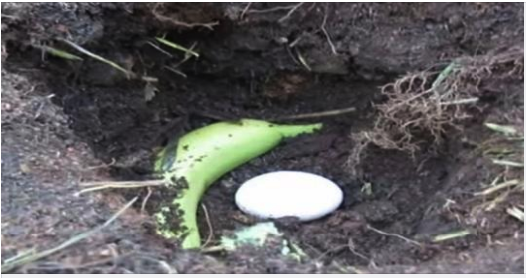In the tomato planting hole he dug, the farmer plants an egg and a banana. The procedure may initially seem strange, but the results are astounding. First results can be seen a few days after planting. This technique is widely used.
The egg and banana that the man dropped into the hole before he dug it has gone popular online, spreading throughout the entire world. The video received nearly 1.2 million views.
The pictures show a man fertilizing vegetables in an original way. He digs a hole in the ground and places an uncooked egg and a banana with its shell still on inside. Plant the tomato seedlings on top of them, then cover them with soil.

Over time, the egg and banana will decompose and release the purported “magic nutrients,” which are essential for vegetable seeds. The man switched to a very efficient natural fertilizer that only needed two ingredients instead of chemical fertilizers, which are detrimental for the soil, vegetables, and human health.
We are all aware that when the ecology and ozone layer deteriorate, it gets harder and harder to cultivate fruits and vegetables, which affects both their flavor and look. Because of this, they use a lot of fertilizers.
Problematically, these fertilizers are frequently synthetic rather than natural. When chemical fertilizers are used in excess, the soil, fruits, and vegetables become “poisoned,” which poses a major risk to consumers.
Despite the fact that these chemicals hasten plant growth and enhance the appearance of fruits and vegetables, they have a detrimental effect on food flavor and will undoubtedly cause long-term crop damage. Plants that have been weakened by fertilizers are more prone to illness and pest infestation, which makes growth and development more challenging and occasionally impossible.
It is suggested to use natural fertilizers as frequently as possible due to the broad range that are accessible. As evidenced by the extensive illustration using the egg and banana above, natural fertilizers such as ash, manure, and vegetable waste may also be inexpensive.

